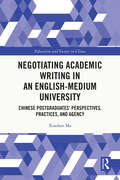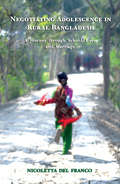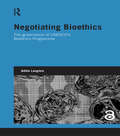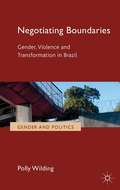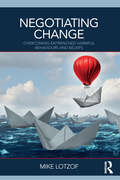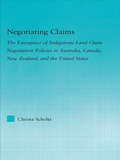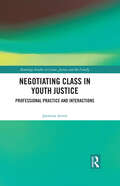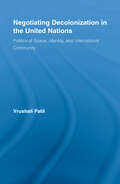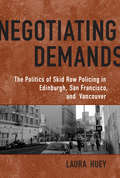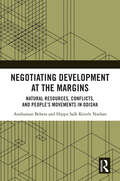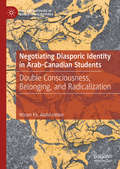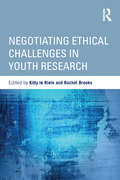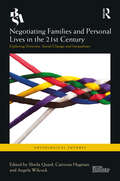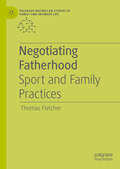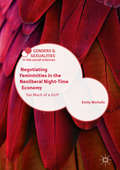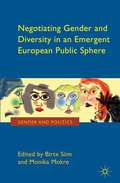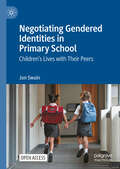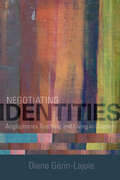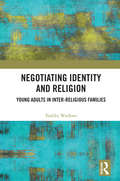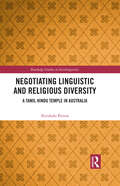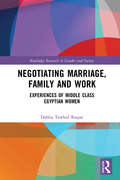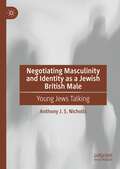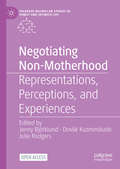- Table View
- List View
Negotiating Academic Writing in an English-Medium University: Chinese Postgraduates’ Perspectives, Practices, and Agency (Education and Society in China)
by Xiaohao MaBuilding on a collection of students’ perspectives and narratives, Ma examines how non-native English speaking (NNES) students negotiate English academic writing (EAW) to reveal the general patterns and distinct routes in addressing challenges in higher education.With the significant expansion of internationalization and student mobility, the discourse on cross-border education and how NNES students navigate the high-stakes educational journey remain pertinent. This book presents an in-depth qualitative study that investigates how NNES students in an English-medium university negotiate the demands of EAW in postgraduate study. The research foregrounds NNES students’ experiences and provides a comprehensive understanding of how they perceive, experience, and address the challenges of EAW by focusing on a group of mainland Chinese students studying in Hong Kong. Key topics discussed include the impact of English as an academic lingua franca on non-native speakers, the roles of universities in supporting these students, and lessons of individuals addressing academic challenges.Written for NNES students, researchers and practitioners in higher education, including language professionals and other specialists in language teaching, this compelling text will also interest general readers of academic and linguistic literacy.
Negotiating Adolescence in Rural Bangladesh: A Journey through School, Love and Marriage
by Nicoletta Del FrancoThe book interrogates the experience of being young and becoming adult in rural Bangladesh, in a context of profound processes of socio economic change. Throughout South Asia, new educational opportunities and an increase in the age at which girls and boys get married are opening new spaces for young people to live the passage to adulthood. This book documents and describes the everyday reality of this changing gendered transition for young people in a rural area of South West Bangladesh. If focuses on three main areas that are central to young people's experience: those of college and student life, friendships and relationships with those of the same sex and across sexes and marriage and the issues involved in the choice of a marriage partner.
Negotiating Bioethics: The Governance of UNESCO’s Bioethics Programme (Genetics and Society)
by Adèle LangloisA PDF version of this book is available for free in Open Access at www.tandfebooks.com. It has been made available under a Creative Commons Attribution-Non Commercial-No Derivatives 3.0 license. The sequencing of the entire human genome has opened up unprecedented possibilities for healthcare, but also ethical and social dilemmas about how these can be achieved, particularly in developing countries. UNESCO’s Bioethics Programme was established to address such issues in 1993. Since then, it has adopted three declarations on human genetics and bioethics (1997, 2003 and 2005), set up numerous training programmes around the world and debated the need for an international convention on human reproductive cloning. Negotiating Bioethics presents Langlois' research on the negotiation and implementation of the three declarations and the human cloning debate, based on fieldwork carried out in Kenya, South Africa, France and the UK, among policy-makers, geneticists, ethicists, civil society representatives and industry professionals. The book examines whether the UNESCO Bioethics Programme is an effective forum for (a) decision-making on bioethics issues and (b) ensuring ethical practice. Considering two different aspects of the UNESCO Bioethics Programme – deliberation and implementation – at international and national levels, Langlois explores: how relations between developed and developing countries can be made more equal who should be involved in global level decision-making and how this should proceed how overlap between initiatives can be avoided what can be done to improve the implementation of international norms by sovereign states how far universal norms can be contextualized what impact the efficacy of national level governance has at international level
Negotiating Boundaries
by Polly WildingThe favelas (slums) of Rio de Janeiro provide an ideal case study since they are renowned for high levels of police and gang violence resulting in high death rates among young black men, causing both outrage and fear. This book foregrounds women's experiences and how different forms of violence overlap and reinforce one another.
Negotiating Change: Overcoming Entrenched Harmful Behaviours and Beliefs
by Mike LotzofBehaviour change programs fail more often than they succeed. Failure is avoidable, but not if we keep attempting change the same way. Negotiating Change is the culmination of decades of work with global corporations in ethics, communications, behaviour change and regulatory and social compliance. The book provides a text for corporate leaders, their advisors and academics and students from several disciplines to explain why the current approach to behaviour change and compliance fails, and documents why the author’s approach has been successful in more than 60 countries. The book synthesises research insights from evolutionary psychology, behavioural sciences, neuroscience and neurochemistry into a practical guide. It explains why systems for behavioural guidance and control based on beliefs, religions, ethics, cultures and the law are ineffective in our globalised, hyper-connected, multi-cultural world. The author proposes that harm, first introduced by Hippocrates to guide the practice of medicine, provides a more useful linguistic model to engage. Harm and the Harm Principles provide an objective, independent and universal measure for assessing behaviour, applying equally regardless of race, religion, gender, age or status. Harm is culturally neutral and operates independently of laws, philosophies or codes of conduct. Harm transcends geography and time. Corporations are particularly vulnerable as they operate not just across jurisdictions and cultures, but their behaviour is influenced by the very nature of incorporation, corporate structure and stock-market pressure. Negotiating Change contains tools for boards and senior executives who want to build a more trustworthy organisation. It will not stop bad people doing bad things, but at least the self-righteous mask of legality will be removed.
Negotiating Claims: The Emergence of Indigenous Land Claim Negotiation Policies in Australia, Canada, New Zealand, and the United States (Indigenous Peoples and Politics)
by Christa ScholtzWhy do governments choose to negotiate indigenous land claims rather than resolve claims through some other means? In this book Scholtz explores why a government would choose to implement a negotiation policy, where it commits itself to a long-run strategy of negotiation over a number of claims and over a significant course of time. Through an examination strongly grounded in archival research of post-World War Two government decision-making in four established democracies - Australia, Canada, New Zealand, and the United States - Scholtz argues that negotiation policies emerge when indigenous people mobilize politically prior to significant judicial determinations on land rights, and not after judicial change alone. Negotiating Claims links collective action and judicial change to explain the emergence of new policy institutions.
Negotiating Class in Youth Justice: Professional Practice and Interactions (Routledge Studies in Crime, Justice and the Family)
by Jasmina ArnežThis book examines how class shapes interactions between professionals, parents, and young people in the youth justice system, utilising a mix of contemporary social theory and a wealth of empirical material. It suggests ways to neutralise the effects of class on youth justice interventions in structurally unequal societies and argues for reform based on conceptions of negotiated justice, relational agency, and autonomy in dependence. The author develops a theoretical framework to explore how class is negotiated within youth justice, taking as its starting point the work of Bourdieu on habitus, Boltanski and Thévenot on the sociology of lay normativity, and Sayer’s work on moral understandings of class. This is combined with a detailed reading of empirical material gathered through focus groups, interviews with practitioners, parents and children, and participant observation of parenting courses. The result is an innovative revisiting of the part that social class plays in determining who is diverted into and away from youth justice and a sustained theoretical and empirical argument for the continued importance of class in criminological research. This book offers an original contribution to the fields of criminology, youth justice, and crime and the family. It provides an important source of knowledge for academics and practitioners interested in discussions on social class and indirect discrimination.
Negotiating Decolonization in the United Nations: Politics of Space, Identity, and International Community (New Approaches in Sociology)
by Vrushali PatilCombining discourse and comparative historical methods of analysis, this book explores how colonialists and anti-colonialists renegotiated transnational power relationships within the debates on decolonization in the United Nations from 1946-1960. Shrewdly bringing together Sociology, Women’s Studies, History, and Postcolonial Studies, it is interested in the following questions: how are modern constructions of gender and race forged in transnational – colonial as well as ‘postcolonial’ – processes? How did they emerge in and contribute to such processes during the colonial era? Specifically, how did they shape colonialist constructions of space, identity and international community? How has this relationship shifted with legal decolonization?
Negotiating Demands
by Laura HueyThe relationship between policing and the governance of society is an important and complex one, especially as it relates to destitute areas. Through a comparative analysis of policing in skid row districts in three cities -Edinburgh, San Francisco, and Vancouver - Negotiating Demands offers an inside look at the influence of local political, moral, and economic issues on police practices within marginalized communities.Through an analysis of various theoretical approaches and ethnographic field data, Laura Huey unveils a portrait of skid row policing as a political process. Police are regularly called upon to negotiate often-conflicting sets of demands, especially within the context of disadvantaged or troubled neighbourhoods. Examining a broad spectrum of police procedures and community responses, Huey offers a reconceptualization of the police as political actors who 'negotiate demands' of different constituencies. How the police meet these demands - through incident- and context-specific uses of law enforcement, peacekeeping, social work, and knowledge work - are shown to be a product of the civic environment in which they operate and of the 'moral-economic' forces that shape public discourse.Negotiating Demands is an original and thought-provoking study that not only advances our knowledge of police organization and decision-making strategies but also refines our understanding of how processes of social inclusion and exclusion occur in different liberal regimes and how they can be addressed.
Negotiating Development at the Margins: Natural Resources, Conflicts, and People’s Movements in Odisha
by Anshuman Behera Hippu Salk NathanThis book critically examines various facets of conflicts involving people and the state arising due to the uneven distribution of natural resources. It provides an overview of the people’s movements in Odisha, a resource-rich state in eastern India. Reflecting on the conceptual frameworks of conflict, it analyses violence, and struggle for rights over resources, and public policies around natural resources, alongside local strategies and governance. Drawing from extensive field surveys in the villages of Kalahandi and undivided Koraput districts in Odisha, this volume explores the sociopolitical and economical aspects of people’s movements instead of solely viewing them as political and security threats. The authors demonstrate the misappropriations of these movements by both the state and non-state actors for their vested interests. This book offers recommendations for policymakers to draw up a more ready response to mitigate and minimize the conflict and violence and implement equitable policies around land and resources. While doing so, the book also provides some primers to development perspectives, the role of natural resources and conditions under which the natural resources can result in conflict, and principles and practices to overcome such conflicts. The volume will be an indispensable read for researchers and students of social history, social reform, tribal and indigenous studies, postcolonial studies, exclusion studies, development studies, political sociology, and South Asian studies.
Negotiating Diasporic Identity in Arab-Canadian Students: Double Consciousness, Belonging, and Radicalization (Palgrave Studies in Educational Futures)
by Wisam Kh. Abdul-JabbarThis book, framed through the notion of double consciousness, brings postcolonial constructs to sociopolitical and pedagogical studies of youth that have yet to find serious traction in education. Significantly, this book contributes to a growing interest among educational and curriculum scholars in engaging the pedagogical role of literature in the theorization of an inclusive curriculum. Therefore, this study not only recognizes the potential of immigrant literature in provoking critical conversation on changes young people undergo in diaspora, but also explores how the curriculum is informed by the diasporic condition itself as demonstrated by this negotiation of foreignness between the student and selected texts.
Negotiating Ethical Challenges in Youth Research (Critical Youth Studies)
by Rachel Brooks Kitty Te RieleNegotiating Ethical Challenges in Youth Research brings together contributors from across the world to explore real-life ethical dilemmas faced by researchers working with young people in a range of social science disciplines. Unlike literature that tends to discuss youth research at an abstracted and exalted level, this volume aims to make the basic principles and guidelines of youth research more ‘real.’ By openly discussing actual challenges that researchers have experienced in the course of conducting their fieldwork or interpreting their findings, this collection provides the most authentic overview of the ethics of youth research available. A careful selection of chapters addresses a range of ethical challenges particularly relevant to contemporary youth researchers. Each chapter identifies an ethical issue that the author has personally experienced in his or her youth research, explains why this was a challenge or dilemma, outlines how the researcher responded to the challenge, and provides advice and draws out broader implications for youth researchers. The chapters are organized around three themes that capture core ethical challenges: power and agency, protection and harm prevention, and trust and respect. The result is a collection that is a rigorous and valuable resource to those embarking on research with young people for the first time as well as supporting the resolution of ethical challenges by more experienced researchers.
Negotiating Europe
by Oriane CalligaroThe book explores the various actors and forms of the promotion of Europeanness at the EU level from 1950s until the present day.
Negotiating Families and Personal Lives in the 21st Century: Exploring Diversity, Social Change and Inequalities (Sociological Futures)
by Sheila Quaid, Catriona Hugman and Angela WilcockThis book is a vital new resource in the sociological study of family life in the 21st century. The chapters in this volume explore a diverse range of family and intimate life experiences, such as personal choices about reproduction and how life choices and family forms are mediated by factors including geographical location, race, ethnicity, sexuality, gender, income and government policy. Through a series of evidence-based chapters, leading sociologists explore a diverse range of family and intimate life experiences and the contexts within which they are lived and experienced. Each chapter delves into the lives and experiences of people whose choices in some way seem to disrupt normative and traditional ideas of family, parenting and childhood. Family patterns and experiences of living apart together, troubled families, children in care, culture, coupledom, same-sex families and digital technology are covered and examined innovatively through theoretical engagement. Chapters also incorporate innovative technologies and their use within family spaces that shape the nature of human relationships and interactions. These negotiations within the family are globally contextualised within the political and ideological frameworks of societies at any given moment in time. The work recognises the sensitivity of family and personal lives and incorporates the increasing need of the impact of emotionality that forms part of knowledge production. Additionally, innovative methods are showcased in chapters on researching the family through socially just methods, researcher emotionality and visual data. By bringing together thought-provoking research findings and innovative methodological and theoretical approaches, this collection of essays raises and articulates relevant, timely and future thinking for its readers. This book will therefore be indispensable for students and researchers as well as professionals and policymakers interested in understanding family life in the 21st century.
Negotiating Fatherhood: Sport and Family Practices (Palgrave Macmillan Studies in Family and Intimate Life)
by Thomas FletcherThis book examines the tensions and ambivalences which men encounter as they negotiate contemporary expectations of fatherhood and fulfill their own expectations of what it means to be a ‘good’ father. There is little doubt that today’s fathers are responding to new expectations about fatherhood and fathering practices. The remote, detached, breadwinning father of the past, once lauded as a masculine ideal, has faded, and men are now expected to be ‘involved’, ‘intimate’, ‘caring’ and ‘domesticated’ fathers. Using a family practices lens and a case study of sport, Fletcher elucidates the changes and continuities in family and fathering practices in different historical periods and contexts. Negotiating Fatherhood will be of interest to students and scholars with an interest in family and fathering practices, sport, leisure, and gender.
Negotiating Femininities in the Neoliberal Night-Time Economy: Too Much of a Girl? (Genders and Sexualities in the Social Sciences)
by Emily NichollsThis book explores the ways in which young women negotiate gendered and classed identities in nightlife venues. With a particular focus on the under-researched phenomenon of the ‘girls’ night out’, this text explores tensions around what it means to be ‘girly’ in bars, pubs and clubs, examining throughout the ways in which being a ‘girly girl’ is simultaneously desired and derided in a postfeminist context. Drawing on research conducted in Newcastle-upon-Tyne, UK, this original and comprehensive book explores the value and meaning of the ‘girls’ night out’ for young women, and its instrumental role in the negotiation of friendships and femininities. Nicholls covers a range of themes, including alcohol consumption, dress, and risk management, providing engaging and timely insights into women’s leisure as a site for the negotiation of gendered identities. Negotiating Femininities in the Neoliberal Night-Time Economy will be of interest to students and scholars across the social sciences with an interest in gender, class and the Night-Time Economy.
Negotiating Gender and Diversity in an Emergent European Public Sphere
by Birte Siim Monika MokreThe book analyses intersections between gender and diversity through cross-national studies of European public spheres. The approach confronts research on European democracy and the public sphere with gender and diversity research and reflections about European equality and diversity issues are based on new research from a large-scale EU project.
Negotiating Gendered Identities in Primary School: Children’s Lives with Their Peers
by Jon SwainThis open access book explores young children’s lives in their later years at primary school, from their own point of view. It focuses on how girls and boys experience life in their informal peer group and explores the dynamics of friendships and social hierarchies, identities and how time is spent outside of lessons, including the use of social media. The author interrogates how children make meanings: who they think they are, what it means to be a girl or a boy, and what forms of femininity and masculinity are most dominant. Findings are based on interviews conducted at a middle-class state school and a fee-paying preparatory school on the outskirts of London. The book will be of interest to students and scholars of primary education, schooling and gender, as well as primary school teachers both in the UK and internationally.
Negotiating Identities: Anglophones Teaching and Living in Quebec
by Diane Gerin-LajoieAs members of an official linguistic minority in Canada, Anglophone teachers living and working in Quebec have a distinct experience of the relationship between language and identity. In Negotiating Identities, Diane Gérin-Lajoie uses survey data and the life stories of Anglophone teachers to illustrate the social practices which connect them with their linguistic, cultural, and professional identities.Exploring the complexity of identity as a lived experience, Negotiating Identities demonstrates the strength of language as a political force in these educators' lives both in the classroom and outside it. Through comparisons with the other official linguistic minority in Canada, the Francophones, and particularly with Franco-Ontarians, this book tells the stories of Quebec's Anglophone teachers in their own words, providing a unique account of how these individuals make sense of their lives as residents of Quebec.
Negotiating Identity and Religion: Young Adults in Inter-religious Families
by Toolika WadhwaThis book examines the religious lives of young adults growing up in inter-religious families in India. It explores complex questions of identity, social background, and religion in twenty-first-century India. The volume studies the religious commitments of young adults, analyses the identity formation process for a critical age group, and discusses the interpersonal dynamics within inter-religious families. Drawing on real life stories of mixed heritage – Hindu, Sikh, Muslim, Christian, Jain, Buddhist, and Parsi – this volume will be of great interest to scholars and researchers of psychology, education, sociology and social anthropology, religious studies, politics, and other interdisciplinary studies.
Negotiating Identity in the Ancient Mediterranean
by Denise DemetriouThe Mediterranean basin was a multicultural region with a great diversity of linguistic, religious, social, and ethnic groups. This dynamic social and cultural landscape encouraged extensive contact and exchange among different communities. This book seeks to explain what happened when different ethnic, social, linguistic, and religious groups, among others, came into contact with each other. What means did they employ to mediate their interactions? How did each group construct distinct identities while interacting with others? What new identities came into existence because of these contacts? Denise Demetriou brings together several strands of scholarship that have emerged recently, especially ethnic, religious, and Mediterranean studies. It reveals new aspects of identity construction in the region examining the Mediterranean as a whole and focuses not only on ethnic identity but also other types of collective identities, such as civic, linguistic, religious, and social identities.
Negotiating Linguistic and Religious Diversity: A Tamil Hindu Temple in Australia (Routledge Studies in Sociolinguistics)
by Nirukshi PereraDiversity is a buzzword of our times and yet the extent of religious diversity in Western societies is generally misconceived. This ground-breaking research draws attention to the journey of one migrant religious institution in an era of religious superdiversity. Based on a sociolinguistic ethnography in a Tamil Saivite temple in Australia, the book explores the challenges for the institution in maintaining its linguistic and cultural identity in a new context. The temple is faced with catering for devotees of diverse ethnicities, languages, and religious interpretations; not to mention divergent views between different generations of migrants who share ethnicity and language. At the same time, core members of the temple seek to continue religious and cultural practices according to the traditions of their homelands in Sri Lanka, a country where their identity and language has been under threat. The study offers a rich picture of changing language practices in a diasporic religious institution. Perera inspects language ideology considerations in the design of institutional language policy and how such policy manifests in language use in the temple spaces. This includes the temple’s Sunday school where heritage language and religion interplay in second-generation migrant adolescents’ identifications and discourse.
Negotiating Marriage, Family and Work: Experiences of Middle Class Egyptian Women (Routledge Research in Gender and Society)
by Dahlia Tawhid RoqueCaught between two worlds of social transition and modern progression, young women in the Middle East have for some time been forging means to balance conventional gender roles and marriage expectations, while also advancing their position in society through improved legal status, health and educational attainment. Yet, with half of Egypt’s university-educated women out of the labour market and not seeking work, this study reveals why middle-class women continue to pursue a degree that they fail to use. This book sheds light onto the lives of highly educated middle-class Egyptian women, where they share their stories of spouse selection and marriage, and how education, wealth and unyielding gender roles influence their employment status. Through qualitative ethnography, Negotiating Marriage, Family and Work gives voice to young Egyptian women, both married and single, presenting their self-perceptions, their roles as mothers and wives, and their agency. Carried out from the time of the Arab Spring, this research uncovers the key strategies that middle-class women employ to secure their economic well-being in their marital and domestic contexts, as well as the barriers that married women face in combining paid work and family care.
Negotiating Masculinity and Identity as a Jewish British Male: Young Jews Talking
by Anthony J. NichollsIn this book, Dr. Anthony Nicholls uses a series of in-depth interviews to investigate how young Jews talk about their Jewishness, Britishness, and masculinity. From his analysis, he argues that Jewishness is constructed between adherence to halachic requirement on one hand, and Jewishness experienced as cultural affinity to history, family, and tradition without recourse to halacha on the other hand. He further argues that Britishness is experienced between varying degrees of nationalistic localism against cosmopolitan liberalism played out against a backdrop of Britain contrasted with the rest of the world, and also London against the rest of Britain. Nicholls rejects the view that masculinity is constructed in the inherently unstable terms of physicality against intellectualism. Instead, he argues that it is better considered as lying in a range between competitive hegemonic masculinity and a cooperative model with which physicality and intellectualism combine to produce a more stable and emotionally satisfying mode of living.
Negotiating Non-Motherhood: Representations, Perceptions, and Experiences (Palgrave Macmillan Studies in Family and Intimate Life)
by Jenny Björklund Dovilė Kuzminskaitė Julie RodgersThis open access edited volume focuses on the representations, perceptions, and experiences of women who do not have children against the backdrop of traditional gender norms, pronatalist policies, and patriarchal structures. While involuntary and voluntary childlessness have typically been treated separately and studied within different disciplines in most previous scholarship, contributing authors explore non-motherhood beyond the involuntary/voluntary divide and consider a wide range of conceptualizations of women who do not become mothers. The editors bring together a variety of perspectives from different national contexts and disciplines, including family studies, gender studies, literary and cultural studies, sociology, and film studies to explore non-motherhood. The book focuses on how women who choose or experience non-motherhood are negotiated, felt, represented, and received.
